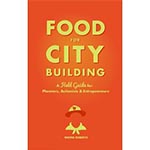Nourishing Communities Interviews Wayne Roberts on Food for City Building
Posted: April 29, 2014
Categories: GoodFoodBites / News from Sustain Members
 “I believe food organizers should present themselves as offering a platform, rather than a fixed body of answers. In my view, such a stance respects food for what it does best in the public realm; it invites people to take their own power, personally and collectively,” writes Wayne Roberts in an interview with Phil Mount, a representative of Nourishing Communities, a project of the Sustainable Food Systems Research Project at the Laurier Centre for Sustainable Food Systems. Mount recently interviewed Wayne Roberts about the topics presented in his newly released e-book, Food for City Building: A Field Guide for Planners, Actionists and Entrepreneurs. This conversation between two members of the Sustain Ontario alliance sheds light on how the local food movement is making an impact by reframing conversations with policymakers and planners to demonstrate the central role that food can play in tackling a number of social and economic issues, leveraging the power of social media as a public education tool and discussion platform, and identifying diverse players that can and do take action in the deployment of food as an agent of change.
“I believe food organizers should present themselves as offering a platform, rather than a fixed body of answers. In my view, such a stance respects food for what it does best in the public realm; it invites people to take their own power, personally and collectively,” writes Wayne Roberts in an interview with Phil Mount, a representative of Nourishing Communities, a project of the Sustainable Food Systems Research Project at the Laurier Centre for Sustainable Food Systems. Mount recently interviewed Wayne Roberts about the topics presented in his newly released e-book, Food for City Building: A Field Guide for Planners, Actionists and Entrepreneurs. This conversation between two members of the Sustain Ontario alliance sheds light on how the local food movement is making an impact by reframing conversations with policymakers and planners to demonstrate the central role that food can play in tackling a number of social and economic issues, leveraging the power of social media as a public education tool and discussion platform, and identifying diverse players that can and do take action in the deployment of food as an agent of change.
Read the full interview on the Nourishing Communities website.
When I started at the Toronto Food Policy Council (TFPC), I saw my job as convincing people in other City departments or other units of Toronto Public Health (my mother ship), as well as the general public, that they should support various projects of the TFPC –the parks department should help with community gardens, for example– because that was the right thing to do for the city’s food security.
After eight years of beating my head against that wall, I realized I had to “stop selling and start marketing,” as the marketing slogan goes. While working with a team on the Medical Officer of Health’s food strategy, I realized that food could be presented not as an added burden for overworked managers of outside departments, but as a lever to make their life easier. Gardens in parks could be presented as increasing public appreciation for diversity and inclusiveness in parks, improving public safety through additional users at dawn and dusk, and so on – all for a very modest expense.
That was the genesis of the Food for City Building idea. I translated the food security agenda into a checklist that made life easier for a wide variety of people who had a different city-building agenda, as distinct from a food security agenda.
Given that cities have no formal mandate to deal with food, I think that’s the most positive and persuasive case we can make for cities to take up food issues in a bold, comprehensive and far-reaching way. If we succeed, it will be a breakthrough that will have entire city administrations get behind a positive food agenda.
